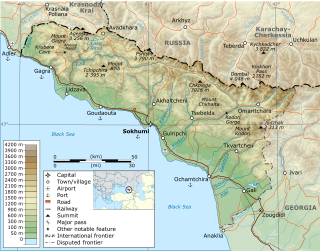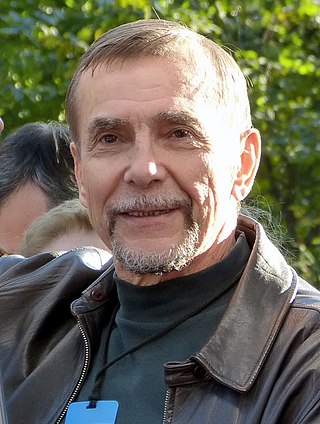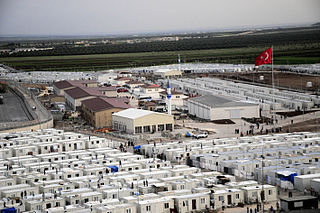Related Research Articles
The right of return is a principle in international law which guarantees everyone's right of voluntary return to, or re-entry to, their country of origin or of citizenship. The right of return is part of the broader human rights concept freedom of movement and is also related to the legal concept of nationality. While many states afford their citizens the right of abode, the right of return is not restricted to citizenship or nationality in the formal sense. It allows stateless persons and for those born outside their country to return for the first time, so long as they have maintained a "genuine and effective link".

The International Rescue Committee (IRC) is a global humanitarian aid, relief, and development nongovernmental organization. Founded in 1933 as the International Relief Association, at the request of Albert Einstein, and changing its name in 1942 after amalgamating with the similar Emergency Rescue Committee, the IRC provides emergency aid and long-term assistance to refugees and those displaced by war, persecution, or natural disaster. The IRC is currently working in about 40 countries and 26 U.S. cities where it resettles refugees and helps them become self-sufficient. It focuses mainly on health, education, economic wellbeing, power, and safety.
Memorial is an international human rights organisation, founded in Russia during the fall of the Soviet Union to study and examine the human rights violations and other crimes committed under Joseph Stalin's reign. Subsequently, it expanded the scope of its research to cover the entire Soviet period.

Russia has consistently been criticized by international organizations and independent domestic media outlets for human rights violations. Some of the most commonly cited violations include deaths in custody, the systemic and widespread use of torture by security forces and prison guards, the existence of hazing rituals within the Russian Army —referred to as dedovshchina — as well as prevalent breaches of children's rights, instances of violence and prejudice against ethnic minorities, and the targeted killings of journalists.

Muhacir are the estimated millions of Ottoman Muslim citizens, and their descendants born after the onset of the dissolution of the Ottoman Empire, mostly Turks but also Albanians, Bosniaks, Greek Muslims, Circassians, Crimean Tatars, Pomaks, Serb Muslims, Georgian Muslims, and Muslim Roma who emigrated to East Thrace and Anatolia from the late 18th century until the end of the 20th century, mainly to escape ongoing persecution in their homelands. Up to a third of modern-day population in Turkey may have ancestry from these Turkish and other Muslim migrants.

The ethnic cleansing of Georgians in Abkhazia, also known in Georgia as the genocide of Georgians in Abkhazia, refers to the ethnic cleansing, massacres, and forced mass expulsion of thousands of ethnic Georgians living in Abkhazia during the Georgian-Abkhaz conflict of 1992–1993 and 1998 at the hands of Abkhaz separatists and their allies. Armenians, Greeks, Russians, and opposing Abkhazians were also killed.

Immigration to Turkey is the process by which people migrate to Turkey to reside in the country. Many, but not all, become Turkish citizens. After the dissolution of the Ottoman Empire and following Turkish War of Independence, an exodus by the large portion of Turkish (Turkic) and Muslim peoples from the Balkans, Caucasus, Crimea, and Greece took refuge in present-day Turkey and moulded the country's fundamental features. Trends of immigration towards Turkey continue to this day, although the motives are more varied and are usually in line with the patterns of global immigration movements. Turkey's migrant crisis is a following period since the 2010s, characterized by high numbers of people arriving and settling in Turkey.

The War in Abkhazia was fought between Georgian government forces for the most part and Abkhaz separatist forces, Russian government armed forces and North Caucasian militants between 1992 and 1993. Ethnic Georgians who lived in Abkhazia fought largely on the side of Georgian government forces. Ethnic Armenians and Russians within Abkhazia's population largely supported the Abkhazians and many fought on their side. The separatists received support from thousands of North Caucasus and Cossack militants and from the Russian Federation forces stationed in and near Abkhazia.

Lev Aleksandrovich Ponomaryov is a Russian political and civil activist. He is an executive director of the all-Russian movement "For Human Rights." He is a member of the Federal Political Council of Solidarnost, and was deputy to the State Duma in its first period.

Svetlana Alekseevna Gannushkina is a mathematician and human rights activist in Russia who was reported to have been a serious contender for the 2010 Nobel Peace Prize.

The Syrian civil war is an ongoing multi-sided conflict in Syria involving various state-sponsored and non-state actors. In March 2011, popular discontent with the rule of Bashar al-Assad triggered large-scale protests and pro-democracy rallies across Syria, as part of the wider Arab Spring protests in the region. After months of crackdown by the government's security apparatus, various armed rebel groups such as the Free Syrian Army began forming across the country, marking the beginning of the Syrian insurgency. By mid-2012, the crisis had escalated into a full-blown civil war.
Refugees of the Syrian civil war are citizens and permanent residents of Syria who have fled the country throughout the Syrian civil war. The pre-war population of the Syrian Arab Republic was estimated at 22 million (2017), including permanent residents. Of that number, the United Nations (UN) identified 13.5 million (2016) as displaced persons, requiring humanitarian assistance. Of these, since the start of the Syrian civil war in 2011 more than six million (2016) were internally displaced, and around five million (2016) had crossed into other countries, seeking asylum or placed in Syrian refugee camps worldwide. It is often described as one of the largest refugee crises in history.

War crimes in the Syrian civil war have been numerous and serious. A United Nations report published in August 2014 stated that "the conduct of the warring parties in the Syrian Arab Republic has caused civilians immeasurable suffering". Another UN report released in 2015 stated that the war has been "characterized by a complete lack of adherence to the norms of international law" and that "civilians have borne the brunt of the suffering inflicted by the warring parties". Various countries have prosecuted several war criminals for a limited number of atrocities committed during the Syrian civil war.

Palestinians in Syria are people of Palestinian origin, most of whom have been residing in Syria after they were displaced from their homeland during the 1948 Palestinian expulsion and flight. Palestinians hold most of the same rights as the Syrian population, but cannot become Syrian nationals except in rare cases. In 2011, there were 526,744 registered Palestinian refugees in Syria. Due to the Syrian Civil War, the number of registered refugees has since dropped to about 450,000 due to many Palestinians fleeing to Lebanon, Jordan or elsewhere in the region to escaping to Europe as refugees, especially to Germany and Sweden.

During the ongoing Russo-Ukrainian War between the Ukrainian government forces and pro-Russian separatists in the Donbas region of Ukraine that began in April 2014, many international organisations and states noted a deteriorating humanitarian situation in the conflict zone.
A refugee crisis can refer to difficulties and dangerous situations in the reception of large groups of forcibly displaced persons. These could be either internally displaced, refugees, asylum seekers or any other huge groups of migrants.

Oyub Salmanovich Titiev is a Russian human rights activist and the head of Memorial's Grozny, Chechnya office. In 2018 he was arrested on politically motivated charges, sparking an international campaign by human rights groups calling for his release. On October 8, 2018, Titiev was awarded the Václav Havel Human Rights Prize, which honours "outstanding" defence of human rights in Europe and beyond.
"Refugees as weapons" is a term used to describe a hostile government organizing, or threatening to organize, a sudden influx of refugees into another country or political entity with the intent of causing political disturbances in that entity. The responsible country usually seeks to extract concessions from the targeted country and achieve some political, military, and/or economic objective.

The Turkish migrant crisis, sometimes referred to as the Turkish refugee crisis, was a period during the 2010s characterised by a high number of people migrating to Turkey. Turkey received the highest number of registered refugees of any country or territory each year from 2014 to 2019, and had the world's largest refugee population according to the United Nations High Commissioner for Refugees (UNHCR). The majority were refugees of the Syrian Civil War, numbering 3.6 million as of June 2020. In 2018, the UNHCR reported that Turkey hosted 63.4% of all "registered Syrian refugees."
The Hass refugee camp bombing was an aerial bombardment of a refugee camp in the Syrian opposition-held town of Hass in the Idlib Governorate of Syria, which has been deemed a war crime by Human Rights Watch. It was perpetrated on 16 August 2019, at 7:25 p.m. local time, during the Syrian civil war. The bombing killed 20 civilians, including a pregnant woman, and injured another 52 people.
References
- 1 2 The Nobel Peace Prize: Who will win this year?, BBC News (6 October 2016)
- 1 2 Daria Litvinova (14 October 2016). "Russia's Refugees: They Picked the Wrong Country". The Moscow Times. Retrieved 4 April 2022.
- ↑ George Leech (9 February 2017). "Migrant Children Turned Away from Schools in Russia". Human Rights Watch . Retrieved 4 April 2022.
- ↑ "Dispatches: Another Day, Another 'Foreign Agent' Designation in Russia". Human Rights Watch. Retrieved 2023-08-16.